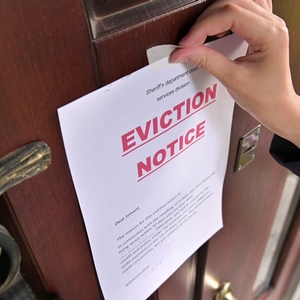Financial Services Litigation

Financial Services Law Blog
Litigation is not late in challenging new CFPB Rule capping credit card late fees.

Financial Services Law Blog
Lenders Beware of Potential Litigation Stemming from Credit Decisions Based on AI




Financial Services Law Blog
After Years of Mortgage Escrow Limbo, National Banks Will Soon Learn Their Fate

Financial Services Law Blog
Lenders Beware: New Restrictions in Effect regarding Force-placed Insurance in Missouri

Financial Services Law Blog
Update: The Aftermath of the Fifth Circuit CFPB Holding

Product Liability Law Blog
The Impact of Mallory v. Norfolk Southern R. Co. in Illinois, Missouri & Kansas


Financial Services Law Blog
Western District refuses to dismiss coverage dispute after material change in circumstances.


Financial Services Law Blog
Holding the Purse and Wielding the Sword: The Fifth Circuit Finds CFPB's Funding Mechanism Unconstitutional

Financial Services Law Blog
Tenth Circuit Mandates "Reasonable Consumer" standard for FDCPA claims

Financial Services Law Blog
Secured Creditors of Missouri Get Some Guidance and Good News from the Missouri Supreme Court

Financial Services Law Blog
Arbitration Agreements Need Not Be Balanced


Financial Services Law Blog
Missouri Court Clarifies Issues of Prejudgment Interest Pre-2021

Illinois Law Blog
TRO Puts Illinois Judicial Circuit Redistricting to a Halt

Missouri Law Blog
The Pandemic Continues to Impact Kansas City Area Trials and Verdicts

Financial Services Law Blog
Significant 2021 Financial Services Industry Decisions and Legislation

Financial Services Law Blog
Update: Supreme Court Holds No Concrete Injury in FCRA Class Action Case

Financial Services Law Blog
FHFA Structure Declared Unconstitutional by SCOTUS

Financial Services Law Blog
Kansas Merchants May Soon Impose Surcharges on Credit Card Transactions

Financial Services Law Blog
Illinois' Predatory Loan Prevention Act Takes Effect

Missouri Law Blog
The Kansas City Area Saw Trials Plummet in 2020 Due to the Pandemic

Financial Services Law Blog
U.S. Supreme Court to Review FCRA Class Action Jury Verdict

Financial Services Law Blog
You Better Watch Out... for Scammers


Financial Services Law Blog
U.S. Supreme Court Rules CFPB Structure Unconstitutional

Employment & Labor Law Blog
Inaccurate Background Reports Concerning Job Applicants May Give Rise to Employer Liability under FCRA

Missouri Law Blog
Missouri House Approves Stricter Standards for Punitive Damages Claims

Financial Services Law Blog
Tips for Small Businesses Considering PPP Loan Relief


Kansas Law Blog
Kansas Temporarily Prohibits Foreclosures and Evictions

Financial Services Law Blog
CFPB Constitutionality Case Submitted to Supreme Court Today


Product Liability Law Blog
United States Supreme Court Holds Counterclaim Defendants May Not Remove Diverse Lawsuits




Missouri Law Blog
Hopping on the Missouri Bandwagon? Not so Fast Out-of-State Litigants.

Missouri Law Blog
City of St. Louis - Still A Judicial Hellhole


Financial Services Law Blog
Change in Leadership Marks Turning Point for CFPB

Financial Services Law Blog
Bitcoin, Bankers, and Barriers to Legislation

Financial Services Law Blog
Update - Senate Unwinds CFPB Arbitration Rule

Financial Services Law Blog
Swift Litigation Ensues Following Equifax Data Hack

Financial Services Law Blog
New CFPB Rule Prohibits Consumer Waiver of Class Action Litigation


Financial Services Law Blog
SCOTUS upholds narrow interpretation of "debt collector" under the FDCPA

Financial Services Law Blog
Financial CHOICE Act Garners Sufficient Votes in House Vote

Product Liability Law Blog
You've Got Mail - Service of Process by Mail is Satisfactory under the Hague Service Convention

Drug / Device Law Blog
Federal Judge Clobbers Claims in a Class III Medical Device Case

Financial Services Law Blog
Missouri Court Finds that Overdraft Fees are Money Well Spent

Kansas Law Blog
Reunited and it Feels so Good

Financial Services Law Blog
Community Banks Press On in Fight for Regulation Reform

Missouri Law Blog
The Daubert Standard - Coming Soon to a Missouri Court Near You

Product Liability Law Blog
Federal Judges Blow Their Stacks Over Boilerplate Objections

Financial Services Law Blog
CFPB Sets its Sights on Student Loan Servicing

Financial Services Law Blog
Favorable Ruling for Loan Servicers regarding Statute of Limitations

Financial Services Law Blog
Challenges Remain to Widespread Implementation of e-Mortgages

Financial Services Law Blog
FinCEN Issues New Advisory to Financial Institutions Regarding Reporting of Cyber-Events

Financial Services Law Blog
Structure of CFPB declared unconstitutional in PHH Mortgage holding

Financial Services Law Blog
Future of CFPB Uncertain under Trump Administration


Missouri Law Blog
SCOTUS Deadlock results in favorable outcome for Missouri bank

Kansas Law Blog
Kansas Courts Reluctant to Find Waiver of Arbitration



Kansas Law Blog
Prevailing-party agents entitled to attorney's fees


Product Liability Law Blog
In a differential etiology, experts need not rule out all possible causes

Kansas Law Blog
Punitive Damages Part 1: Don't Get Caught Flat-Footed

Kansas Law Blog
Kansas abolishes assumption of the risk defense.


Kansas Law Blog




















